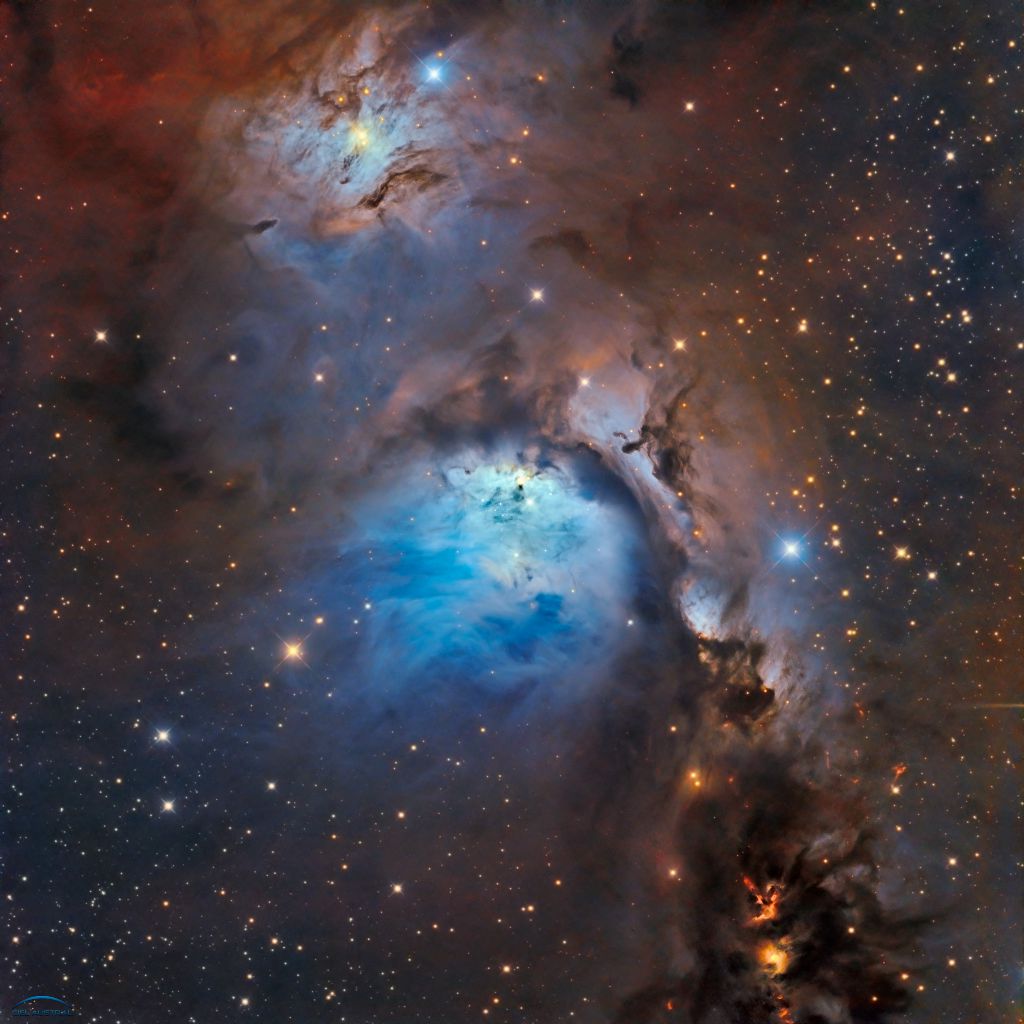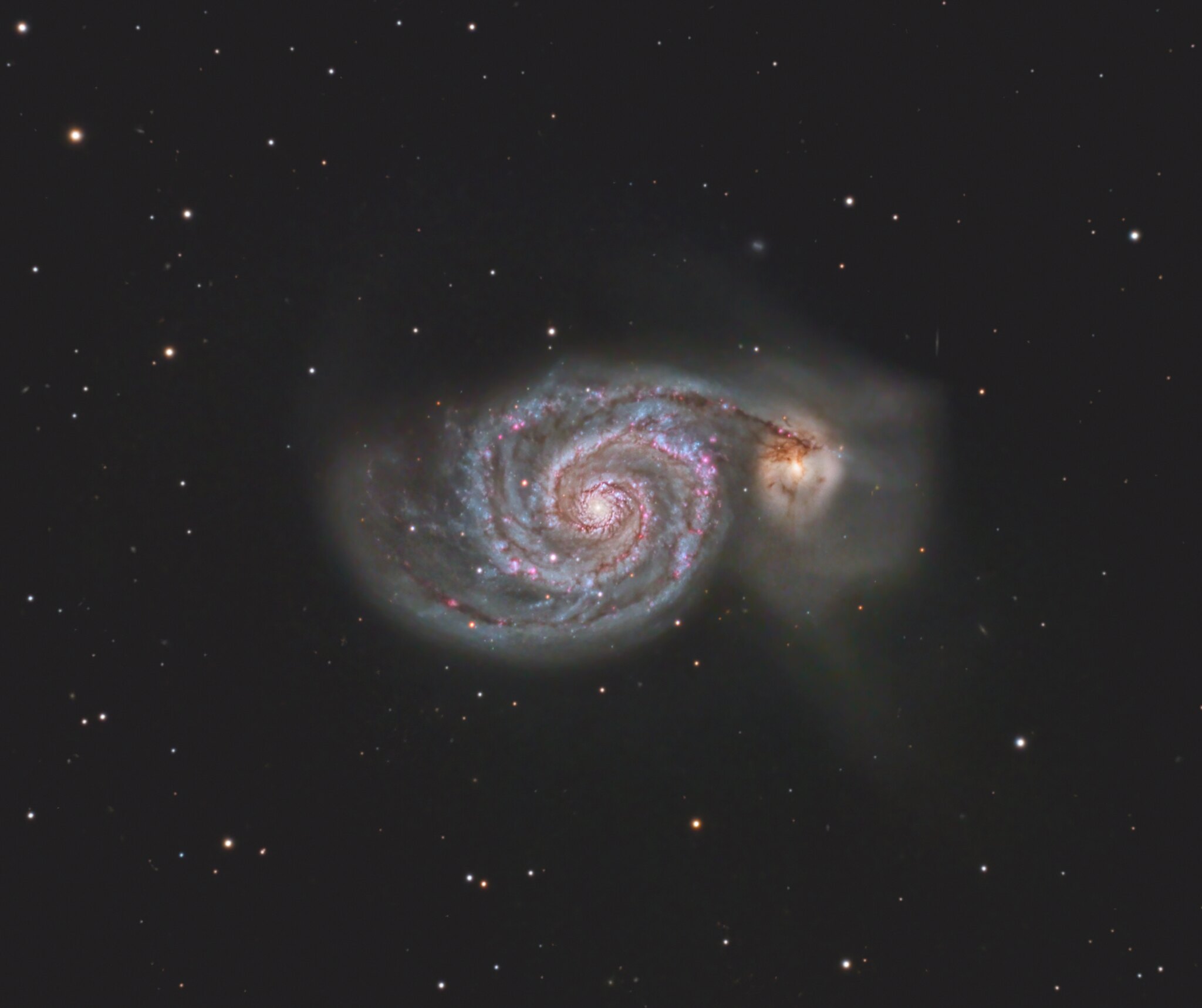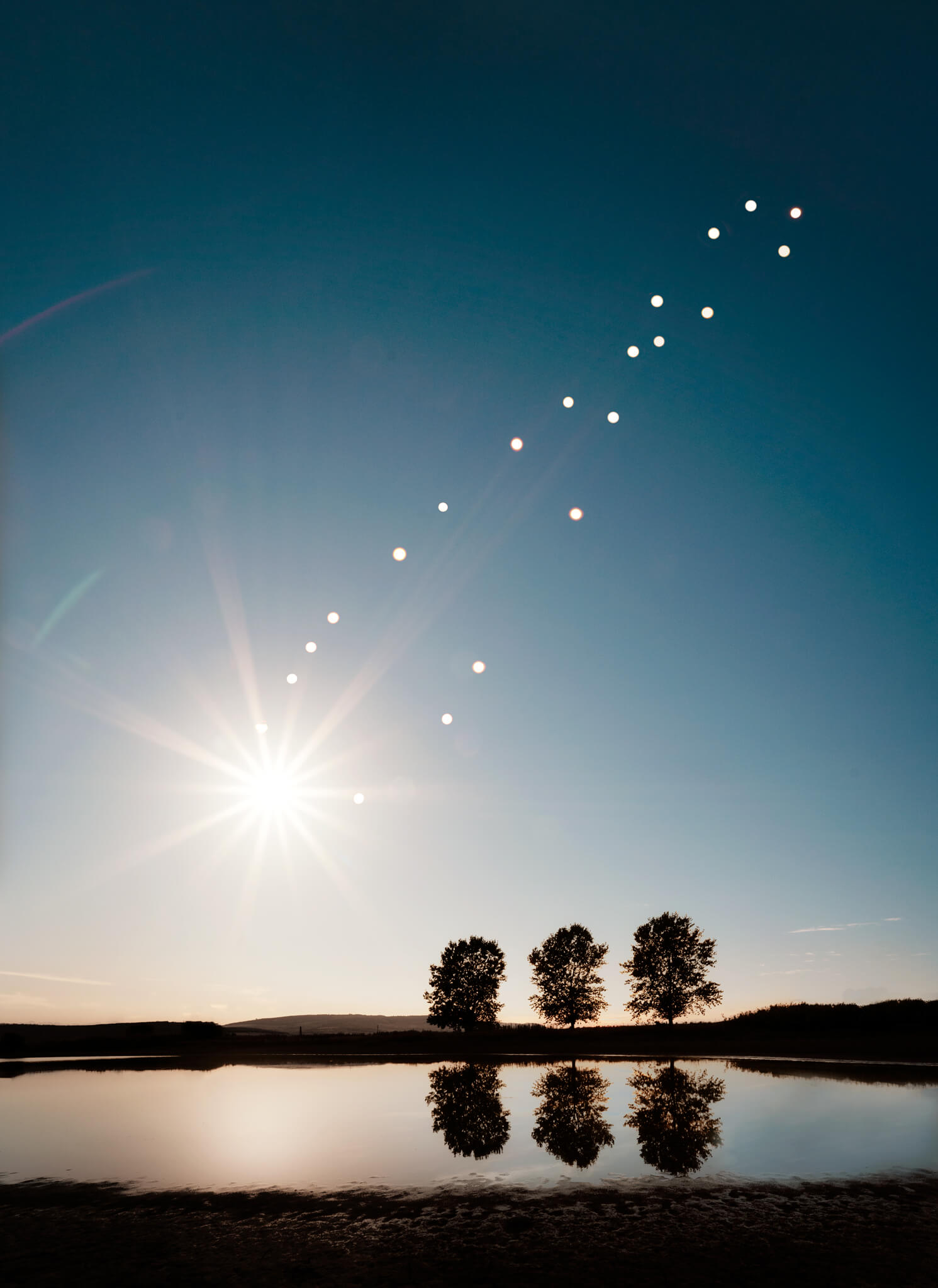Submissions: 2021 March
Re: Submissions: 2021 March
Flying High....the Seagull Nebula
Click on above for larger image.
Full details @ https://www.kinchastro.com/ic-2177-seagull-2021.html
Click on above for larger image.
Full details @ https://www.kinchastro.com/ic-2177-seagull-2021.html
-
vanamonde81
- Science Officer
- Posts: 141
- Joined: Fri Apr 12, 2013 7:46 am
Re: Submissions: 2021 March
Moonset above Megyeri bridge
Copyright: György Soponyai
The lockdown of COVID-19 pandemic let me discover lots of new photo locations in walking distances near my home. For example: I just realized that despite the 13 km distance, I don't need to travel for capturing great shots about Megyeri bridge, the northernmost and youngest one of Budapest.
Monday evening was very cold with heavy turbulent crosswinds that made almost all of my telephotos blurry -- maybe except this one where the 56-hour-old waxing crescent Moon is setting above the bridge.
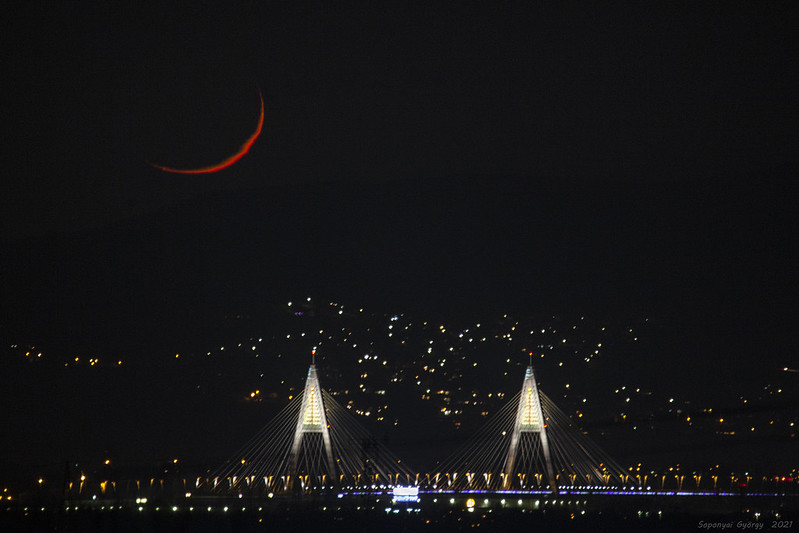
2021-03-15 Mogyoród, Hungary
Canon EOS 5D Mark II + Tamron EF 150-600 @600mm
1.3 sec, f/6.3, ISO 800
Copyright: György Soponyai
The lockdown of COVID-19 pandemic let me discover lots of new photo locations in walking distances near my home. For example: I just realized that despite the 13 km distance, I don't need to travel for capturing great shots about Megyeri bridge, the northernmost and youngest one of Budapest.
Monday evening was very cold with heavy turbulent crosswinds that made almost all of my telephotos blurry -- maybe except this one where the 56-hour-old waxing crescent Moon is setting above the bridge.

2021-03-15 Mogyoród, Hungary
Canon EOS 5D Mark II + Tamron EF 150-600 @600mm
1.3 sec, f/6.3, ISO 800
-
Efrain Morales
- Science Officer
- Posts: 491
- Joined: Fri Oct 22, 2010 8:15 pm
- AKA: Jaicoa
- Location: Aguadilla, Puerto Rico
- Contact:
Mars-Jan.2020-Mar.2021
Mars apparition and oppositions from January 2020 Through March 2021.
- felopaul
- Ensign
- Posts: 96
- Joined: Mon Apr 29, 2013 7:14 pm
- AKA: Felopaul
- Location: Flagey (France)
- Contact:
Re: Submissions: 2021 March
M 78
LRGB : full size/info : http://www.cielaustral.com/galerie/photo131.html
14 Hrs total frames
done with CDK20, Moravian G4-16000 on Paramount ME2 near Actacama Desert in Chile, El Sauce Observatory
http://www.cielaustral.com
Copyright: Team CielAustral with J.C CANONNE, G.CHASSAIGNE, N.OUTTERS, P. BERNHARD, D. CHAPLAIN & L. BOURGON
LRGB : full size/info : http://www.cielaustral.com/galerie/photo131.html
14 Hrs total frames
done with CDK20, Moravian G4-16000 on Paramount ME2 near Actacama Desert in Chile, El Sauce Observatory
http://www.cielaustral.com
Copyright: Team CielAustral with J.C CANONNE, G.CHASSAIGNE, N.OUTTERS, P. BERNHARD, D. CHAPLAIN & L. BOURGON
-
chadleader
- Asternaut
- Posts: 1
- Joined: Tue Mar 16, 2021 8:15 pm
Re: Submissions: 2021 March
Here's my HaLRGB M51 shot from Washington DC
Celestron Edge HD 8, ASI294MM Pro
35 hours total integration, captured between March 3 - 9, 2021
Bortle 8-9 backyard
Credit: Chad Leader
Celestron Edge HD 8, ASI294MM Pro
35 hours total integration, captured between March 3 - 9, 2021
Bortle 8-9 backyard
Credit: Chad Leader
Re: Submissions: 2021 March
IC 2177
Click on image for larger view.
Full info @ https://www.kinchastro.com/ic-2177-seagull-2021.html
Click on image for larger view.
Full info @ https://www.kinchastro.com/ic-2177-seagull-2021.html
Re: Submissions: 2021 March
Our infinite Sun
https://tripswithrosie.com/
Copyright: Rositsa Dimitrova
Explanation: We're almost at the spring equinox, so here's a post dedicated to the Sun. This is the analemma of the Sun - how our own star moves across our sky for the entire year. If you were to take a photograph at the exact same time and position (without moving the tripod) every couple of weeks, this would be the end result. The top part is smaller because the Earth moves slower around the Sun during the aphelion (when the Sun is farthest from us) in the beginning of July. The bottom points represent the Sun during the winter solstice and the perihelion (the closest point of the Sun and Earth) in the beginning of January. Of course, the inclination of the analemma depends on what time of the day you choose to photograph it, as well as where you are on Earth. In this case, the time was 15:30 and the location - Bulgaria (Northern hemisphere). If you are in the Southern hemisphere, however, the top part of it would be broader than the bottom. At the Equator, the solar analemma would be horizontal, and only half of it would be visible from the North and South poles.
Social: https://www.instagram.com/rosie.kerrigan/
https://tripswithrosie.com/
Copyright: Rositsa Dimitrova
Explanation: We're almost at the spring equinox, so here's a post dedicated to the Sun. This is the analemma of the Sun - how our own star moves across our sky for the entire year. If you were to take a photograph at the exact same time and position (without moving the tripod) every couple of weeks, this would be the end result. The top part is smaller because the Earth moves slower around the Sun during the aphelion (when the Sun is farthest from us) in the beginning of July. The bottom points represent the Sun during the winter solstice and the perihelion (the closest point of the Sun and Earth) in the beginning of January. Of course, the inclination of the analemma depends on what time of the day you choose to photograph it, as well as where you are on Earth. In this case, the time was 15:30 and the location - Bulgaria (Northern hemisphere). If you are in the Southern hemisphere, however, the top part of it would be broader than the bottom. At the Equator, the solar analemma would be horizontal, and only half of it would be visible from the North and South poles.
Social: https://www.instagram.com/rosie.kerrigan/
-
Riccardofiuco
- Ensign
- Posts: 12
- Joined: Sat Sep 17, 2016 1:34 pm
- AKA: Riccardo Crescimbeni
Re: Submissions: 2021 March
The tentacles of the medusa
We are located in the constellation of Gemini, at a distance of about 5,000 light years. Between 3,000 and 30,000 years ago a supernova exploded, generating the rest of the event that we can observe today. It is thought that the core of the star that generated the explosion formed a neutron star, a pulsar. All this makes IC443 a very studied object.
ORION UK CT10 f4. 8
10micron GM2000 HPS
Asi294mm
Astronomik H alpha 6nm
45x300" bin2 - 15°
Astronomik OIII 7nm 68x300 "
Astronomik SII 12nm 24X300"
SOFTWARE: PIXINSIGHT, PHOTOSHOP, VOYAGER
IMAGE TAKEN FROM COSTALPINO SIENA
We are located in the constellation of Gemini, at a distance of about 5,000 light years. Between 3,000 and 30,000 years ago a supernova exploded, generating the rest of the event that we can observe today. It is thought that the core of the star that generated the explosion formed a neutron star, a pulsar. All this makes IC443 a very studied object.
ORION UK CT10 f4. 8
10micron GM2000 HPS
Asi294mm
Astronomik H alpha 6nm
45x300" bin2 - 15°
Astronomik OIII 7nm 68x300 "
Astronomik SII 12nm 24X300"
SOFTWARE: PIXINSIGHT, PHOTOSHOP, VOYAGER
IMAGE TAKEN FROM COSTALPINO SIENA
-
nicola montecchiari
- Ensign
- Posts: 64
- Joined: Tue Sep 14, 2010 3:14 pm
- Location: Milano, Italy
- Contact:
NGC 2170
Copyrights : Raul Villaverde, Domingo Pestana y Nicolas Romo
 NGC 2170_2021 by Raul Villaverde, en Flickr
NGC 2170_2021 by Raul Villaverde, en Flickr
 NGC 2170_2021 by Raul Villaverde, en Flickr
NGC 2170_2021 by Raul Villaverde, en FlickrRe: Submissions: 2021 March
The Fly
HaOIII bi-color
The object commonly known as “The Fly” is a combination of a red emission nebula, blue reflection nebula, and an open star cluster. The star cluster is listed in the New General Catalog (NGC) as NGC 1931, while the nebulosity is included in the Sharpless catalog as Sh2-237. NGC 1931 is located in an extension of the Perseus Arm of the Milky Way about 7000 light-years away. The stars are relatively young at an age of about 10 million years. A study by A.K. Pandey and H.S. Mahra suggest the nebulosity may be a background object to the star cluster (http://articles.adsabs.harvard.edu//ful ... 3.000.html).
The Fly is often imaged in a wide field view with “The Spider” nebula (IC 417) which appears much larger and dominates the field. I have always admired the compact cocoon-like shape of The Fly and chose to highlight its unique features.
Nick Pavelchak
https://www.astrobin.com/e12qmi/?nc=user
HaOIII bi-color
The object commonly known as “The Fly” is a combination of a red emission nebula, blue reflection nebula, and an open star cluster. The star cluster is listed in the New General Catalog (NGC) as NGC 1931, while the nebulosity is included in the Sharpless catalog as Sh2-237. NGC 1931 is located in an extension of the Perseus Arm of the Milky Way about 7000 light-years away. The stars are relatively young at an age of about 10 million years. A study by A.K. Pandey and H.S. Mahra suggest the nebulosity may be a background object to the star cluster (http://articles.adsabs.harvard.edu//ful ... 3.000.html).
The Fly is often imaged in a wide field view with “The Spider” nebula (IC 417) which appears much larger and dominates the field. I have always admired the compact cocoon-like shape of The Fly and chose to highlight its unique features.
Nick Pavelchak
https://www.astrobin.com/e12qmi/?nc=user
-
Riccardofiuco
- Ensign
- Posts: 12
- Joined: Sat Sep 17, 2016 1:34 pm
- AKA: Riccardo Crescimbeni
Re: Submissions: 2021 March
THE LEO TRIPLET
Also known as the M66 Group, is a small group of galaxies that are approximately 35 million light years from Earth in the constellation of Leo.
The group is formed by the spiral galaxies M66, M65 and NGC 3628.
Personally, when I added color to the luminance, I was fascinated to see the amount of galaxies that spread like wildfire in the background of the field. It's really exciting ...
ORION UK CT10 f4. 8
10micron GM2000 HPS
Asi294mm
Astronomik L 140X180 "
Astronomik RGB TYP2 60X120 "
software:pixinsight 1.8
From the garden of Costalpino Siena
Also known as the M66 Group, is a small group of galaxies that are approximately 35 million light years from Earth in the constellation of Leo.
The group is formed by the spiral galaxies M66, M65 and NGC 3628.
Personally, when I added color to the luminance, I was fascinated to see the amount of galaxies that spread like wildfire in the background of the field. It's really exciting ...
ORION UK CT10 f4. 8
10micron GM2000 HPS
Asi294mm
Astronomik L 140X180 "
Astronomik RGB TYP2 60X120 "
software:pixinsight 1.8
From the garden of Costalpino Siena
Last edited by Riccardofiuco on Sat Mar 20, 2021 2:38 pm, edited 4 times in total.
Re: Submissions: 2021 March
The Great bubble in Canis Major - Sh2-308
http://www.starscapeimaging.com/Sh2-308/Sh2-308.html
Copyright: Jonathan Talbot
http://www.starscapeimaging.com/Sh2-308/Sh2-308.html
Copyright: Jonathan Talbot
-
Alson Wong
- Ensign
- Posts: 84
- Joined: Tue Sep 06, 2011 4:14 am
- Contact:
Re: Submissions: 2021 March
Galaxy Group Hickson 44
Hickson 44 is a group of galaxies in the constellation Leo. From left to right, they are elliptical galaxy NGC 3193, and spiral galaxies NGC 3190, NGC 3187, and NGC 3185.
Copyright: Alson Wong
Hickson 44 is a group of galaxies in the constellation Leo. From left to right, they are elliptical galaxy NGC 3193, and spiral galaxies NGC 3190, NGC 3187, and NGC 3185.
Copyright: Alson Wong
-
JonahRolfness
- Asternaut
- Posts: 3
- Joined: Sat Mar 20, 2021 9:14 pm
Re: Submissions: 2021 March
NGC1999 and Friends in HaLRGB
Copyright: Jonah Rolfness Full Resolution:
https://www.flickr.com/photos/190058450 ... ed-public/
This is a HaLRGB image of The Keyhole Nebula, Waterfall Nebula, and many other wonderful objects sitting below the ever-popular Orion Nebula. The data was collected between January to March 2021 during each new moon. The image is roughly 30 hours in total integration, with 15.5 hours Ha from my backyard and the remaining 14.4h LRGB taken from B2 Sonoran Desert skies.
The equipment used was a GSO 6in F5 Newtonian Reflector paired with a ZWO ASI1600mm and Ioptron IEQ30 Mount. Filters used were ZWO LRGB and Astronomik 6nm Ha. Processed in PixInsight. Hope you enjoy the shot!
Copyright: Jonah Rolfness Full Resolution:
https://www.flickr.com/photos/190058450 ... ed-public/
This is a HaLRGB image of The Keyhole Nebula, Waterfall Nebula, and many other wonderful objects sitting below the ever-popular Orion Nebula. The data was collected between January to March 2021 during each new moon. The image is roughly 30 hours in total integration, with 15.5 hours Ha from my backyard and the remaining 14.4h LRGB taken from B2 Sonoran Desert skies.
The equipment used was a GSO 6in F5 Newtonian Reflector paired with a ZWO ASI1600mm and Ioptron IEQ30 Mount. Filters used were ZWO LRGB and Astronomik 6nm Ha. Processed in PixInsight. Hope you enjoy the shot!
-
Guest
Re: Submissions: 2021 March
NGC 2237 the Rosette Nebula by Cory Arnold.

by Cory_Arnold on Telescopius
The Rosette Nebula is an H II region located near one end of a giant molecular cloud in the Monoceros region of the Milky Way Galaxy. The open cluster NGC 2244 is closely associated with the nebulosity, the stars of the cluster having been formed from the nebula's matter. I've only been at this hobby for 8 months now, so if you're just starting out there's hope for everyone!

by Cory_Arnold on Telescopius
The Rosette Nebula is an H II region located near one end of a giant molecular cloud in the Monoceros region of the Milky Way Galaxy. The open cluster NGC 2244 is closely associated with the nebulosity, the stars of the cluster having been formed from the nebula's matter. I've only been at this hobby for 8 months now, so if you're just starting out there's hope for everyone!
-
Aquilino Molinero
- Asternaut
- Posts: 1
- Joined: Tue Feb 23, 2016 10:52 pm
Re: Submissions: 2021 March
Jellyfish nebulae Ced73/Ced74/IC443/IC444/LBN840/LBN841/LBN844/Sh2-248/Sh2-249/SNR G189.0+03.0/VdB75 narrowfield (c-shorgb)
Also includes Eta Geminorum/Propus, Mu Geminorum/Tejat, and LDN1564-LDN1568.
http://ram.org/images/space/scope/1.4+7 ... 8m_37h.jpg
Total integration: 2218 minutes/37 hours (137/19 x 300/420s or 13.7h for Ha + 94/28 x 300/420s or 11.1h for O3 + 94/35 x 300/420s or 12.2h for S2).
Cameras: QHY163M (16mp mono) and QHY247C (24mp OSC) CMOS cooled to -20 and -15 degrees C.
Telescopes: Takahashi FC100DF Steinheil fluorite doublet and Stellarvue SV70T triplet apochromat refractors @ f/4.9 and @ f/4.8.
Reducers: Takahashi FC-35 (0.66x) and SFFR70-APO (0.8x).
Mount: Paramount MyT.
Filters: 1.25" Astrodon 5nm Ha, 3nm O3, 3nm S2 and 2" Baader UV-IR-Cut
Software: TheSkyX Pro, SharpCap, PixInsight, Topaz Studio 2.
Inline image with reduced quality uploaded to the forum. Full resolution images are available at https://www.astrobin.com/enlic2/ and of the main image at http://ram.org/images/space/scope/1.4+7 ... 8m_37h.jpg
Also includes Eta Geminorum/Propus, Mu Geminorum/Tejat, and LDN1564-LDN1568.
http://ram.org/images/space/scope/1.4+7 ... 8m_37h.jpg
Total integration: 2218 minutes/37 hours (137/19 x 300/420s or 13.7h for Ha + 94/28 x 300/420s or 11.1h for O3 + 94/35 x 300/420s or 12.2h for S2).
Cameras: QHY163M (16mp mono) and QHY247C (24mp OSC) CMOS cooled to -20 and -15 degrees C.
Telescopes: Takahashi FC100DF Steinheil fluorite doublet and Stellarvue SV70T triplet apochromat refractors @ f/4.9 and @ f/4.8.
Reducers: Takahashi FC-35 (0.66x) and SFFR70-APO (0.8x).
Mount: Paramount MyT.
Filters: 1.25" Astrodon 5nm Ha, 3nm O3, 3nm S2 and 2" Baader UV-IR-Cut
Software: TheSkyX Pro, SharpCap, PixInsight, Topaz Studio 2.
Inline image with reduced quality uploaded to the forum. Full resolution images are available at https://www.astrobin.com/enlic2/ and of the main image at http://ram.org/images/space/scope/1.4+7 ... 8m_37h.jpg
Re: Submissions: 2021 March
Lambda Orionis Nebula (mosaic)
Copyright: Paolo Demaria
I spent last 3 astrophotographic months working on a mosaic of the region of Lambda Orionis.
All the pictures were taken from the balcony of my home due to Covid-19 emergency in Italy.
The result Is a mosaic made by 12 panels, 44.7 hours of integration.
Telescope: 80/480 Apo Triplet reduced at f/4.8
Mount: SkyWatcher Eq6Pro
Camera: QHY294C, gain 2500, -25°C
Filter: Optolong l-eNhance
Full resolution: https://www.astrobin.com/elypmo/F/
Copyright: Paolo Demaria
I spent last 3 astrophotographic months working on a mosaic of the region of Lambda Orionis.
All the pictures were taken from the balcony of my home due to Covid-19 emergency in Italy.
The result Is a mosaic made by 12 panels, 44.7 hours of integration.
Telescope: 80/480 Apo Triplet reduced at f/4.8
Mount: SkyWatcher Eq6Pro
Camera: QHY294C, gain 2500, -25°C
Filter: Optolong l-eNhance
Full resolution: https://www.astrobin.com/elypmo/F/
Re: Submissions: 2021 March
Mandel-Wilson 2
Click on image to enlarge.
Full info @ https://www.kinchastro.com/mw2-dust-angel.html
Click on image to enlarge.
Full info @ https://www.kinchastro.com/mw2-dust-angel.html
Re: Submissions: 2021 March
 ISS Over Lake Maggiore by Alberto Negro, su Flickr
ISS Over Lake Maggiore by Alberto Negro, su FlickrInternational Space Station transit over Lake Maggiore, Verbania - Italy
March 20, 2021 19.32 UTC+2
Mavic Air2 Drone
Elaboration Photoshop CC
Re: Submissions: 2021 March
Messier 1, the crab nebula.
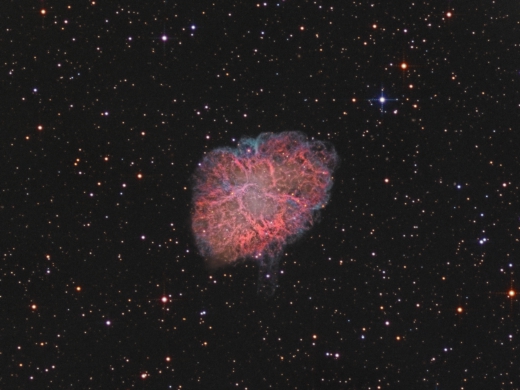
High-resolution image and technical data: http://www.javierlaina.es/IMAGENES/M1.html
Javier Gómez Laina (Spain)
http://www.javierlaina.es/indexeng.html

High-resolution image and technical data: http://www.javierlaina.es/IMAGENES/M1.html
Javier Gómez Laina (Spain)
http://www.javierlaina.es/indexeng.html
-
Victor Lima
- Ensign
- Posts: 70
- Joined: Tue Apr 21, 2020 11:38 am
Re: Submissions: 2021 March
Santa Maria Jump - Iguazu Falls - Brazil
In this image we have the Milky Way Core hovering over the Santa Maria jump, which is one of the main waterfalls in the Iguaçu Falls complex. In addition, we can identify the glowing planets Saturn and Jupiter just above the waterfall and the zodiacal light illuminating the sky and giving more prominence to this incredible landscape.
In order to capture this image, it was necessary to ask permission from the Iguaçu National Park administration to move at night in the park area, which is a risky task, since we have the presence of jaguars and pumas at the site.
In addition, the waterfalls generate a water spray so strong that we stop being in the shower when capturing images. Capturing this image took a lot of work, determination, courage and persistence.
EXIF:
Single Shot
Canon EOS 6Da / Canon EF 16-35mm f/2.8L II USM
17mm / f:2.8 / 10sec / ISO 6400
In this image we have the Milky Way Core hovering over the Santa Maria jump, which is one of the main waterfalls in the Iguaçu Falls complex. In addition, we can identify the glowing planets Saturn and Jupiter just above the waterfall and the zodiacal light illuminating the sky and giving more prominence to this incredible landscape.
In order to capture this image, it was necessary to ask permission from the Iguaçu National Park administration to move at night in the park area, which is a risky task, since we have the presence of jaguars and pumas at the site.
In addition, the waterfalls generate a water spray so strong that we stop being in the shower when capturing images. Capturing this image took a lot of work, determination, courage and persistence.
EXIF:
Single Shot
Canon EOS 6Da / Canon EF 16-35mm f/2.8L II USM
17mm / f:2.8 / 10sec / ISO 6400
Re: Submissions: 2021 March
Re: Submissions: 2021 March
SNR 110.3 + 11.3, DeHt 5 and vdB 152
http://www.distant-lights.at/vdb152-2013_08_05.htm
Copyright: Thomas Henne
http://www.distant-lights.at/vdb152-2013_08_05.htm
Copyright: Thomas Henne
